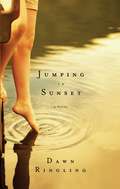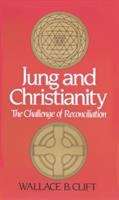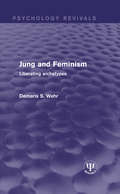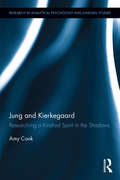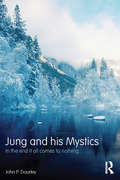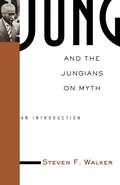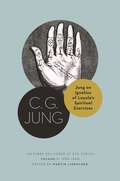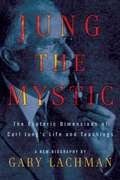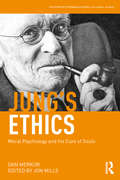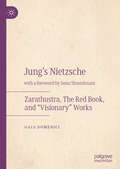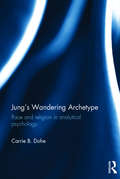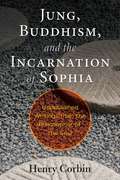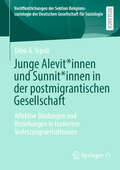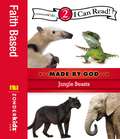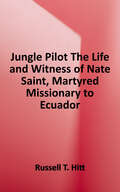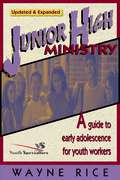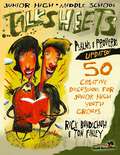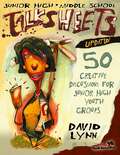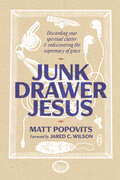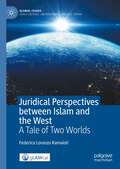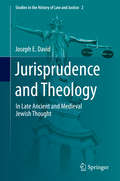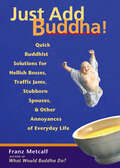- Table View
- List View
Jumping in Sunset
by Dawn RinglingDivorce is not just a fact in Christian circles, it's a common occurrence. Yet most Christian fiction dealing with marital struggles insists that reconciliation is always possible. Jumping in Sunset shows how God's abundant love works through situations where the neat, accepted answers don't. Meet Pamela Thornton, who has a comfortable faith, a twenty-year marriage, and a solid relationship with her college-bound daughter - when her husband announces he's leaving her to marry another woman. Slowly, Pamela learns to understand and experience God within the impossible truth that her marriage has come to an end.
June Hunt Hope for the Heart Biblical Counseling Library
by June HuntSave over $40 when you buy all 36 June Hunt Hope for the Heart Biblical Counseling Library Minibooks. A $143 value for just $99.* Adultery: The Snare of an Affair* Alcohol and Drug Abuse: Breaking Free and Staying Free* Anger: Facing the Fire Within* Anorexia And Bulimia: Control That Is Out Of Control* Bullying: Bully No More* Codependency: Balancing an Unbalanced Relationship* Conflict Resolution: Solving Your People Problems* Confrontation: Challenging Others to Change* Considering Marriage: Are You Fit to Be Tied?* Decision Making: Discerning the Will of God* Depression: Emerging from Darkness into the Dawn* Domestic Violence: Assault on a Woman's Worth* Dyfunctional Family: Making Peace With Your Past* Fear: No Longer Afraid* Financial Freedom: How To Manage Money Wisely* Forgiveness: The Freedom to Let Go* Friendship: Iron Sharpening Iron* Gambling: Betting Your Life Away* Grief: Living at Peace with Loss* Guilt: Living Guilt-Free* Hope: The Anchor of Your Soul* Loneliness: How To Be Alone but Not Lonely* Manipulation: Cutting the Strings of Control* Marriage: To Have and To Hold* Parenting: Steps to Successful Parenting* Perfectionism: The Performance Trap* Overeating: Freedom From Food Fixation* Reconciliation: Restoring Broken Relationships* Rejection: Healing a Wounded Heart* Self-Worth: Discover Your God-Given Worth* Sexual Integrity: Balancing Your Passion with Purity* Singleness: How to be Single & Satisfied* Stress: How to Cope at the End of Your Rope* Success through Failure* Suicide Prevention: Hope When Life Seems Hopeless* Verbal and Emotional Abuse: Victory over Verbal and Emotional Abuse
Jung and Christianity: The Challenge of Reconciliation
by Wallace B. CliftA parish minister attempts to answer the challenge presented to Christianity in the last decade of Jung's life--to make the teachings real in this day and age, and offer true enlightenment of the soul.
Jung and Feminism: Liberating Archetypes (Psychology Revivals)
by Demaris S. WehrJung, in contrast to Freud, has typically been considered more sympathetic to women largely because of his emphasis on the feminine as a way of being in the world and on the ‘anima’, the unconscious feminine aspect of male personality. Feminists, however, have viewed Jung’s whole notion of the ‘feminine’ with suspicion, seeing it as a projection of male psyche and not an authentic understanding of female humanity. For Demaris Wehr both feminism and Jungian psychology have been guiding forces, and in this book, originally published in 1988, she mediates between feminists and classical Jungians – two groups historically at odds. She faces squarely the male-centred assumptions of some Jungian concepts and challenges Jung’s claims for the universality and purely empirical basis of his work, but nevertheless maintains an appreciation for the value of Jung’s understanding of human nature and the process of individuation. By bringing the insights of feminist theology to bear on the seemingly unbridgeable gap between analytical psychology and feminism, she succeeds in reclaiming Jungian psychology as a freeing therapy for women and reveals it as the ultimately liberating vision its founder intended it to be.
Jung and Kierkegaard: Researching a Kindred Spirit in the Shadows (Research in Analytical Psychology and Jungian Studies)
by Amy CookJung and Kierkegaard identifies authenticity, suffering and self-deception as the three key themes that connect the work of Carl Jung and Søren Kierkegaard. There is, in the thinking of these pioneering psychologists of the human condition, a fundamental belief in the healing potential of a religious outlook. This engaging and erudite text explores the significance of the similarities of thinking between Kierkegaard and Jung, bridging the gap between the former’s particular brand of existential Christian psychology and the latter’s own unique philosophy. Given the similarity of their work and experiences that were common to both of their personal biographies, particularly the relationship that each had with his father, one might expect Jung to have found in Kierkegaard a kindred spirit. Yet this was not the case, and Jung viewed Kierkegaard with great scorn. That there exists such a strong comparison and extensive overlap in the life and thought of these towering figures of psychology and philosophy leads us to question why it is that Jung so strongly rejected Kierkegaard. Such hostility is particularly fascinating given the striking similarity that Jung’s own analytical psychology bears to the Christian psychology upheld by Kierkegaard. Cook’s thought-provoking book fills a very real gap in Jungian scholarship and is the first attempt to undertake a direct comparison between Jung and Kierkegaard’s models of development. It is therefore essential reading for academics and postgraduate students with an interest in Jungian and Kierkegaard scholarship, as well as psychology, philosophy and religion more generally.
Jung and his Mystics: In the end it all comes to nothing
by John P. DourleyJung’s psychology describes the origin of the Gods and their religions in terms of the impact of archetypal powers on consciousness. For Jung this impact is the basis of the numinous, the experience of the divine in nature and in human nature. His psychology, while possessed of a certain claim to science, is based on depths of subjective experience which transcends psychology and science as ordinarily understood. Jung and his Mystics: In the end it all comes to nothing examines the mythic nature of Jung’s psychology and thought, and demonstrates the influence of mysticism and certain religious thinkers in formulating his own work. John P. Dourley explores the influence of Mechthild of Magdeburg and fellow mystics/Beguines, and traces the mystic impulse and its expression through Meister Eckhat and Jacob Boehme to Hegel in the nineteenth century. All of these mystics were of the apophatic school and understood the culmination of their experience to lie in an identity with divinity in a nothingness beyond all form, formal expression or immediate activity. Dourley shows how this is still of relevance in our lives today. The book concludes that Jung’s understanding of mysticism could greatly alleviate the conflict between faiths, religious or political, by drawing attention to their common origin in the depths of the human. Jung and his Mystics: In the end it all comes to nothing is aimed at scholars and senior research students in Jungian Studies, including religionists, theologians and philosophers of religion, especially those with an interest in mysticism. It will also be essential reading for those interested in the connection between religious and psychological experience.
Jung and the Jungians on Myth: An Introduction (Theorists of Myth #Vol. 4)
by Steven WalkerFirst Published in 2002. Routledge is an imprint of Taylor & Francis, an informa company.
Jung on Ignatius of Loyola’s Spiritual Exercises: Lectures Delivered at ETH Zurich, Volume 7: 1939–1940 (Philemon Foundation Series #27)
by C. G. JungJung&’s lectures on the psychology of Jesuit spiritual practice—unabridged in English for the first timeBetween 1933 and 1941, C. G. Jung delivered a series of public lectures at the Swiss Federal Institute of Technology (ETH) in Zurich. Intended for a general audience, these lectures addressed a broad range of topics, from yoga and meditation to dream analysis and the psychology of alchemy. Here for the first time are Jung&’s complete lectures on Ignatius of Loyola&’s Spiritual Exercises, delivered in the winter of 1939–1940.These illuminating lectures are the culmination of Jung&’s investigation into traditional forms of meditation and their parallels to his psychotherapeutic method of active imagination. Jung presents Loyola&’s exercises as the prime example of a Christian practice comparable to yoga and Eastern meditation, and gives a psychological interpretation of the visions depicted in the saint&’s autobiographical writings. Offering a unique opportunity to encounter the brilliant psychologist as he shares his ideas with the general public, the lectures reflect Jung&’s increasingly positive engagement with Roman Catholicism, a development that would lead to his fruitful collaborations after the war with eminent Catholic theologians such as Victor White, Bruno de Jésus-Marie, and Hugo Rahner.Featuring an authoritative introduction by Martin Liebscher along with explanations of Jungian concepts and psychological terminology, this splendid book provides an invaluable window on the evolution of Jung&’s thought and a vital key to understanding his later work.
Jung the Mystic
by Gary LachmanNow in paperback, this bold new biography fills a gap in our understanding of the pioneering psychologist by focusing on the occult and mystical aspects of Jung’s thought and career. “Outstanding . . . lifts the curtain on one of the most important aspects of his remarkable life . . . fair and objective. ” —Alice O. Howell, Quest magazine “How the Swiss psychologist lived a life rich in the paranormal. ” —Los Angeles Times “A serious but comprehensible new biography of Jung and his interest in the esoteric. ” —New Age Retailer “Fascinating . . . Fully engaging from beginning to end. ” —Dell Horoscope Although he is often called the “founding father of the New Age,” Carl Jung, the legendary Swiss psychiatrist best known for his groundbreaking concepts such as the collective unconscious, archetype theory, and synchronicity, often took pains to avoid any explicit association with mysticism or the occult. Yet Jung lived a life rich in paranormal experiences—arguing for the existence of poltergeists in a debate with Sigmund Freud, participating in séances, incorporating astrology into his therapeutic work, reporting a near-death experience, and analyzing the work of pioneering ESP researcher J. B. Rhine. It is these critical experiences—often fleetingly touched on in other biographies or critical studies, and frequently used to make a case against Jung and his philosophies—that form the core of this significant new biography. .
Jung's Ethics: Moral Psychology and his Cure of Souls (Philosophy and Psychoanalysis)
by Dan MerkurThis volume presents the first organized study of Jung's ethics. Drawing on direct quotes from all of his collected works, interviews, and seminars, psychoanalyst and religious scholar Dan Merkur provides a compendium of Jung’s thoughts on various topics and themes that comprise his theoretical corpus—from the personal unconscious, repression, dreams, good and evil, and the shadow, to collective phenomena such as the archetypes, synchronicity, the psychoid, the paranormal, God, and the Self, as well as his contributions to clinical method and technique including active imagination, inner dialogue, and the process of individuation and consciousness expansion. The interconnecting thread in Merkur's approach to the subject matter is to read Jung’s work through an ethical lens. What comes to light is how Merkur systematically portrays Jung as a moralist, but also as a complex thinker who situates the human being as an instinctual animal struggling with internal conflict and naturalized sin. Merkur exposes the tension and development in Jung’s thinking by exploring his innovative clinical-technical methods and experimentation, such as through active imagination, inner dialogue, and expressive therapies, hence underscoring unconscious creativity in dreaming, symbol formation, engaging the paranormal, and artistic productions leading to expansions of consciousness, which becomes a necessary part of individuation or the working through process in pursuit of self-actualization and wholeness. In the end, we are offered a unique presentation of Jung’s core theoretical and clinical ideas centering on an ethical fulcrum, whereby his moral psychology leads to a cure of souls. Jung’s Ethics will be of interest to academics, scholars, researchers, and practitioners in the fields of Jungian studies and analytical psychology, ethics, moral psychology, philosophy, religious studies, and mental health professionals focusing on the integration of humanities and psychoanalysis.
Jung's Nietzsche: Zarathustra, The Red Book, and “Visionary” Works
by Gaia DomeniciThis book explores C.G. Jung's complex relationship with Friedrich Nietzsche through the lens of the so-called 'visionary' literary tradition. The book connects Jung's experience of the posthumously published Liber Novus (The Red Book) with his own (mis)understanding of Nietzsche's Zarathustra, and formulates the hypothesis of Jung considering Zarathustra as Nietzsche's Liber Novus –– both works being regarded by Jung as 'visionary' experiences. After exploring some 'visionary' authors often compared by Jung to Nietzsche (Goethe, Hölderlin, Spitteler, F. T. Vischer), the book focuses upon Nietzsche and Jung exclusively. It analyses stylistic similarities, as well as explicit references to Nietzsche and Zarathustra in Liber Novus, drawing on Jung's annotations in his own copy of Zarathustra. The book then uses Liber Novus as a prism to contextualize and understand Jung's five-year seminar on Zarathustra: all the nuances of Jung's interpretation of Zarathustra can be fully explained, only when compared with Liber Novus and its symbology. One of the main topics of the book concerns the figure of 'Christ' and Nietzsche's and Jung's understandings of the 'death of God.'
Jung's Wandering Archetype: Race and religion in analytical psychology
by Carrie B. DoheIs the Germanic god Wotan (Odin) really an archaic archetype of the Spirit? Was the Third Reich at first a collective individuation process? After Friedrich Nietzsche heralded the "death of God," might the divine have been reborn as a collective form of self-redemption on German soil and in the Germanic soul? In Jung’s Wandering Archetype Carrie Dohe presents a study of Jung’s writings on Germanic psychology from 1912 onwards, exploring the links between his views on religion and race and providing his perspective on the answers to these questions. Dohe demonstrates how Jung’s view of Wotan as an archetype of the collective Germanic psyche was created from a combination of an ancient discourse on the Germanic barbarian and modern theories of primitive religion, and how he further employed völkisch ideology and various colonialist discourses to contrast hypothesized Germanic, Jewish and ‘primitive’ psychologies. He saw Germanic psychology as dangerous yet vital, promising rebirth and rejuvenation, and compared Wotan to the Pentecostal Spirit, suggesting that the Germanic psyche contained the necessary tension to birth a new collective psycho-spiritual attitude. In racializing his religiously-inflected psychological theory, Jung combined religious and scientific discourses in a particularly seductive way, masterfully weaving together the objective language of science with the eternal language of myth. Dohe concludes the book by examining the use of these ideas in modern Germanic religion, in which members claim that religion is a matter of race. This in-depth study of Jung’s views on psychology, race and spirituality will be fascinating reading for all academics and students of Jungian and post-Jungian studies, religious studies and the history of religion.
Jung, Buddhism, and the Incarnation of Sophia: Unpublished Writings from the Philosopher of the Soul
by Henry CorbinExamines the work of Carl Jung in relation to Eastern religion, the wisdom teachings of the Sophia, Sufi mysticism, and visionary spirituality • Reveals the spiritual values underlying the psychoanalytic theories of Carl Jung • Explores the role of the Gnostic Sophia with respect to Jung’s most controversial essay, “Answer to Job” • Presents new revelations about Sufi mysticism and its relationship to esoteric Buddhist practices • Shows how the underlying spiritual traditions of Islam, Judaism, and Christianity mesh with the spiritual teachings of Buddhism Henry Corbin (1903-1978) was one of the most important French philosophers and orientalists of the 20th century. In this collection of previously unpublished writings, Corbin examines the work of Carl Jung in relationship to the deep spiritual traditions of Eastern religion, the esoteric wisdom teachings of Sophia, the transformational symbolism of alchemy, and Sufi mysticism. Looking at the many methods of inner exploration in the East, including the path of the Sufi and Taoist alchemy, Corbin reveals how the modern Western world does not have its own equivalent except in psychotherapy. Expanding Jung’s findings in light of his own studies of Gnostic and esoteric Islamic traditions, he offers a unique insight into the spiritual values underlying Jung’s psychoanalytic theories. Corbin analyzes Jung’s works on Buddhism, providing his own understanding of the tradition and its relationship to Sufi mysticism, and explores the role of the Gnostic Sophia with respect to Jung’s most controversial essay, “Answer to Job.” He also studies the rapport between the Gnostic wisdom of Sophia and Buddhist teachings as well as examining Sophia through the lens of Jewish mysticism. Explaining how Islamic fundamentalists have turned their back on the mystic traditions of Sufism, Corbin reveals how totalitarianism of all kinds threatens the transformative power of the imagination and the transcendent reality of the individual soul. He shows how the underlying spiritual traditions of Islam, Judaism, and Christianity mesh with the spiritual teachings of Buddhism and reinforce the unity of the esoteric teachings of the world’s great religions. Comparing the imaginal realm with Jung’s archetypal field, he shows how we could transform the world by spiritualizing Jung’s methods, enabling us to transcend duality and make the created world divine.
Junge Alevit*innen und Sunnit*innen in der postmigrantischen Gesellschaft: Affektive Bindungen und Beziehungen in tradierten Verletzungsverhältnissen (Veröffentlichungen der Sektion Religionssoziologie der Deutschen Gesellschaft für Soziologie)
by Dilek A. TepeliHistorische Verletzungen zwischen Angehörigen von Großgruppen verblassen nicht einfach über die Zeit hinweg. Am empirischen Fallbeispiel der alevitisch-sunnitischen Verletzungsbeziehungen zeigt sich, dass postmigrantische Gesellschaften durch vielfältige, oftmals unsichtbare Verletzungsverhältnisse ihrer Einwanderungsgruppen mitstrukturiert sind. Diese innere Diversität bleibt jedoch häufig verborgen, weil die Migrationsdebatte oftmals vereinfacht auf „den“ Islam und „die“ Muslim*innen verengt wird. Die vorliegende Untersuchung zeigt stattdessen die Binnendiversität der türkeistämmigen Einwanderungsgruppe(n) auf und nimmt die Verletzungsrisiken junger Alevit*innen und Sunnit*innen in der postmigrantischen Gesellschaft in den Blick. Die empirischen Ergebnisse verdeutlichen zwar gemeinsame Differenzerfahrungen der alevitisch-sunnitischen Jugend als Postmigrant*innen, aber sie legen auch erhöhte Verletzungsrisiken und -potentiale der alevitischen Jugend offen. Dieses zentrale Ergebnis ist relevant für die Integrations- und Migrationsforschung, denn es zeigt wichtige interne Differenzierungen und erhöhte Verletzungsrisiken in heterogenen Einwanderungsgruppen auf.
Jungle Beasts: Level 2 (I Can Read! #Level 2)
by ZondervanThese exciting photos and facts show children the wonders of God’s creation. Includes simple text perfect for level two readers. Titles include: Rainforest Creatures; Under the Sea; Birds of the Air; Bugs, Bugs, Bugs; Freezing Friends; and Creatures Down Under. Rainforest Creatures features unusual yet familiar animals like the sloth and the tree kangaroo and facts about their habitat. Under the Sea will feature facts about sea creatures such as the giant squid, baseball fish, and the blue-ringed octopus. Birds of the Air will include facts about flying friends like the macaw, toucan, flamingo, and yellow-bellied sapsucker. Bugs, Bugs, Bugs will tell about stinkbugs, dung beetles, killer bees, and more. Creatures Down Under will tell about the platypus, kookaburra, kangaroo, and crocodile and coral. Freezing Friends will focus on Polar bears, seal, penguin, and walrus. Farm Animal Babies will focus on familiar farm animal babies, their special names, and characteristics. Forest Animal Babies will focus on fun forest animal babies like raccoons, mountain lions, and baby birds and their special characteristics. Jungle Animal Babies will focus on fun jungle animal babies like monkeys, panthers, and baby birds and their special characteristics.
Jungle Fire
by Bruce PorterfieldThe many instances in this book have been drawn from the experiences of many missionaries. Some of the heartaches, clashes of ideas concerning methods of mission boards, love affairs, raw jungle life in reaching savage tribes, the defeats and victories, have been the realities of many new and experienced servants of God. Some of the methods and practices of a number of mission boards and their personnel are clearly seen in this novel. However, it is not the author's intention to single out any one organization while writing about some of the things that commonly occur. The inward struggles and outward circumstances that Brian Allmand faces are the very things that many new missionaries have come up against. These or similar experiences have crushed and defeated many well intentioned missionaries because methods and principles became insurmountable barriers to them. Brian is one of the few missionaries with firm convictions who is willing to challenge what appears to be man-guided rules. He gets into all kinds of difficulties for speaking out on his convictions. Was it worth it? The results in principle of his convictions have also been those of a few in true life.
Jungle Pilot: The Gripping Story of the Life and Witness of Nate Saint, Martyred Missionary to Ecuador
by Russell T. HittIn 1956, pilot Nate Saint and four other missionaries were killed in Ecuador by the Waodani(Auca) Indians they had come to serve. Now Nate's gripping story of faithful service for Christ is brought up to date through the epilogue written by his son, Steve.
Junior Comes Clean / VeggieTales / I Can Read! (Big Idea Books / VeggieTales)
by Karen PothA Lesson in Telling the TruthJunior&’s room is a really BIG mess! He says there were a bunch of bad guys who did it. Sooner or later, Junior will have to come clean!This is a Level One I Can Read! book, which means it&’s perfect for children learning to sound out words and sentences. It aligns with guided reading level J and will be of interest to children Pre-K to 3rd grade.
Junior High Ministry: A Guide to Early Adolescence for Youth Workers
by Wayne RiceRowdy, restless, silly, out of control, moody, vulgar, disrespectful, unpredictable -- this may be the junior high stereotype, writes youth ministry expert Wayne Rice. But early adolescents' enthusiasm, loyalty, energy, candidness, and willingness to learn -- these more than compensate for the well-publicized hazards of working with middle schoolers. In this edition of Junior High Ministry -- updated and expanded to reflect the realities of middle school ministry at the turn of the century -- the cofounder of Youth Specialties takes a comprehensive look at the early adolescent experience: - A case for junior high ministry -- and what it takes to work effectively with junior highers. - New material of turn-of-the-century trends in the youth culture -- and on programming for kids living in this culture. - A chapter each on the five pivotal areas of development -- physical, social, intellectual, psycho-emotional, and faith -- among junior highers. - Altogether new chapters on parental involvement and mentoring in the context of junior high ministry . . . all topped off with 50 creative and practical ideas -- fun and games, Bible study openers, mixers, entire events -- that are tailored for junior highers in Sunday school, the youth room, or your living room. Whether you're training for youth work or a trainer of youth workers, Junior High Ministry will keep finding its dog-eared way to the top of your most used resources.
Junior High and Middle School Talksheets Psalms and Proverbs-Updated!: 50 Creative Discussions for Junior High Youth Groups
by Rick Bundschuh Tom FinleyThese updated discussion starters based on the wisdom books of the Old Testament can stand alone or lead into a full-blown Bible study with help from the leaders’ accompanying instructions. Includes Bible references, Internet resources, and other suggested further activities.
Junior High and Middle School Talksheets-Updated!: 50 Creative Discussions for Junior High Youth Groups (TalkSheets)
by David LynnGet Your Students Talking About the Bible And God. And themselves, their beliefs, their questions, their lives. About the things that matter to them. Do it conveniently and effectively with Junior High-Middle School TalkSheets--Updated!, part of the best-selling discussion-starting TalkSheets series from Youth Specialties, now updated for new-millennium students. Here are 50 creative discussions that focus on relevant, real-life topics: Media Influences--TV, Music, Advertising Substance Abuse & Peer Pressure Parents Self-Image & Physical Appearance Jesus Friendships Prayer & Worship Trusting God & Dealing with Doubt . . . and 40 more subjects of perennial interest to teenagers. TalkSheets are one-page reproducible handouts with provocative questions in a compelling design that will get churched and unchurched kids alike talking and thinking about the Bible--and how its principles affect their daily lives. Use TalkSheets to launch your own lesson--or use them as stand-alone Bible studies. Each TalkSheet comes with detailed information and suggestions for discussion leaders: Bible references galore, Internet resources, further group exploration, and activities to pursue during and after the meeting. Junior High-Middle School TalkSheets--Updated! is the perfect discussion-starting resource for youth meetings, small groups and cell groups, Sunday school, and camps and retreats. More than a quarter million copies sold in this series!
Junk Drawer Jesus: Discarding Your Spiritual Clutter and Rediscovering the Supremacy of Grace
by Matt PopovitsEach of us is the owner of a seemingly random collection of theologies, doctrines, and superstitions—a junk drawer of religious ideas and influences. It's the witticisms your grandmother tossed around with ease that sounded like they came from a religious text. It's an insight about God from a half-heard sermon at a friend's church. It's the mental screenshot of a meme shared on social media. It's the empowering idea you underlined in a book and wrote on a Post-it Note now forever affixed to your laptop. These are the things stuffed in our spiritual junk drawers. And as with that stash of old clothes in the closet or that stew of phone chargers, pens, and half-used batteries sitting in your kitchen drawer, something in us says, "This might be useful." And so we hold on. But should we? For many, this junk drawer spirituality has become burdensome. We are worn down by the religious experience it creates and frustrated by a collection of traditions, "truths," and unfulfilled promises that continue to grow. In Junk Drawer Jesus, the spiritually exhausted are invited to examine our religious clutter and compare it to the person and the promises of Jesus Christ. We'll discover what—if anything—of our spiritual collection should be kept. In the process, we rediscover the soul-satisfying simplicity of a God who refuses to fill our lives with junk but instead offers grace upon grace.
Juridical Perspectives between Islam and the West: A Tale of Two Worlds (Global Issues)
by Federico Lorenzo RamaioliThis comparative philosophy of law book aims at formulating a new analytical approach to the Islamic legal tradition based on ‘juridical categories’, a concept that facilitates comprehension and understanding of juridical phenomena. Building upon legal comparativism and legal pluralism, this project intends to avoid bias caused by universalizing Western categories when analyzing foreign juridical notions, which inevitably results in the miscomprehension of non-Western ideas and institutions. Unlike existing literature, this project will not focus on substantive comparisons between normative contents, but on the ‘juridical perspectives’ that helped to shape the Islamic and Western legal orders.The book focuses on the most relevant juridical questions regarding the Islamic and Western legal perspectives, such as the different visions regarding juridical spatiality, the role of human reason and the relationship between law, man and the divinity. While contributing to legal philosophy, this work intends also to develop and define a new interdisciplinary approach, aiming to provide a starting point for novel analyses in research fields such as legal comparativism, legal pluralism, and constitutional law. Finally, by formulating a new interdisciplinary approach, it will provide a foundational discussion of a continuously evolving subject that will never be exhaustively explored. As such, it aims at broadening scholarly reflections on the relationship between the West and Islam, eventually placing these concepts within a suitably comprehensive and contextualized framework. "Published in cooperation with gLAWcal - Global Law Initiatives for Sustainable Development, Hornchurch, Essex, United Kingdom".
Jurisprudence and Theology
by Joseph E. DavidThe book provides in depth studies of two epistemological aspects of Jewish Law (Halakhah) as the 'Word of God' - the question of legal reasoning and the problem of knowing and remembering. - How different are the epistemological concerns of religious-law in comparison to other legal systems? - In what ways are jurisprudential attitudes prescribed and dependent on theological presumptions? - What specifies legal reasoning and legal knowledge in a religious framework? The author outlines the rabbinic jurisprudential thought rooted in Talmudic literature which underwent systemization and enhancement by the Babylonian Geonim and the Andalusian Rabbis up until the twelfth century. The book develops a synoptic view on the growth of rabbinic legal thought against the background of Christian theological motifs on the one hand and Karaite and Islamic systemized jurisprudence on the other hand. It advances a perspective of legal-theology that combines analysis of jurisprudential reflections and theological views within a broad historical and intellectual framework. The book advocates two approaches to the study of the legal history of the Halakhah: comparative jurisprudence and legal-theology, based on the understanding that jurisprudence and theology are indispensable and inseparable pillars of legal praxis.
Just Add Buddha!: Quick Buddhist Solutions for Hellish Bosses, Traffic Jams, Stubborn Spouses, and Other Annoyances of Everyday Life
by Franz Metcalf“A diverse and edifying collection of practices to use in annoying and difficult circumstances” from the author of What Would Buddha Do? (Spirituality & Practice).Written for spiritual seekers who deal with unenlightened coworkers and inconsiderate bank tellers more often than Zen masters and Tibetan monks, this book demonstrates the practical side of Buddhism. Author Franz Metcalf shows how to weave simple vows, quick rethinks, instant relaxations, fast visualizations, and many other stripped-down Buddhist practices into every area of life. Individually, Metcalf’s techniques work as quick fixes for specific dilemmas, but woven together, they gradually strengthen one’s spiritual base when one day a habitual way of being has been quietly transformed. While not written to impress pure Buddhists, this book takes Buddhism seriously. Approachable sections on Buddhism’s rich tradition and a sprinkling of quotes from ancient scripture and contemporary teachers connect the book’s practices to the deeper wisdom underlying them. Always, Just Add Buddha! remains squarely focused on daily life, drawing out the most practical aspects of Buddhism.
